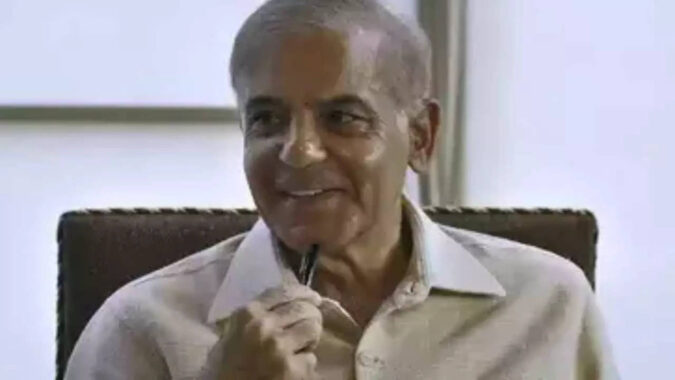ISLAMABAD: Prime Minister Shehbaz Sharif on Thursday said Pakistan‘s decision to attend the SCO foreign ministers’ meeting in India reflects its “commitment” to the SCO Charter and multilateralism as he asserted that his country was committed to playing its part to advance its shared values of peace and stability in the region.
Foreign Minister Bilawal Bhutto Zardari travelled to Goa on Thursday to attend a conclave of the Shanghai Cooperation Organisation (SCO), in the first such high-level visit to India from Pakistan since 2011.
Bilawal’s visit comes amid continued strain in ties between India and Pakistan on a number of issues including Islamabad’s continued support to cross-border terrorism.
“Pakistan’s decision to attend SCO Council of Foreign Ministers’ meeting in India reflects our commitment to the SCO Charter & multilateralism,” Sharif tweeted.
“We are committed to playing our part to advance our shared values of peace & stability in the region. We are all for win-win understandings based on connectivity, trade and mutually advantageous cooperation,” he further said.
Bilawal, who is the first Pakistani foreign minister to visit India since 2011, is leading a delegation to the Council of Foreign Ministers (CFM) of the Beijing-based Shanghai Cooperation Organisation (SCO).
“During my visit, which is focused exclusively on the SCO, I look forward to constructive discussions with my counterparts from friendly countries,” Bilawal tweeted before his departure.
Opposition Pakistan Tehreek-e-Insaf party has “strongly condemned” Bilawal’s visit to Goa, saying his participation would have been possible on video.
“Pak Foreign policy is dead by all definitions of the word,” senior PTI leader and former information minister Chaudhry Fawad Hussain said in a tweet.
Pakistan has said that its foreign minister would not hold any meeting with his Indian counterpart S Jaishankar.
The visit is highly symbolic as it is the first by any Pakistani Foreign Minister since Hina Rabbani Khar travelled to India in July 2011 for peace talks.
Besides Pakistan, SCO member states include China, Russia, Kazakhstan, Kyrgyzstan, Tajikistan, Uzbekistan and India.
Since becoming a member in 2017, Pakistan has been actively and constructively contributing to all SCO activities to realise its multi-sectoral aims and objectives in a mutually beneficial manner, the FO said.
At the conclave, the foreign ministers will deliberate on overall challenges facing the region in the backdrop of the current geo-political turmoil and the state of bilateral ties between member nations would not impact the discussions.
The SCO is an influential economic and security bloc and has emerged as one of the largest trans-regional international organisations.
The SCO was founded at a summit in Shanghai in 2001 by the presidents of Russia, China, the Kyrgyz Republic, Kazakhstan, Tajikistan and Uzbekistan.
The ties between India and Pakistan came under severe strain after India’s warplanes pounded a Jaish-e-Mohammed terrorist training camp in Balakot in Pakistan in February 2019 in response to the Pulwama terror attack.
The relations further deteriorated after India announced the withdrawal of special powers of Jammu and Kashmir and the bifurcation of the state into two union territories in 2019.
Foreign Minister Bilawal Bhutto Zardari travelled to Goa on Thursday to attend a conclave of the Shanghai Cooperation Organisation (SCO), in the first such high-level visit to India from Pakistan since 2011.
Bilawal’s visit comes amid continued strain in ties between India and Pakistan on a number of issues including Islamabad’s continued support to cross-border terrorism.
“Pakistan’s decision to attend SCO Council of Foreign Ministers’ meeting in India reflects our commitment to the SCO Charter & multilateralism,” Sharif tweeted.
“We are committed to playing our part to advance our shared values of peace & stability in the region. We are all for win-win understandings based on connectivity, trade and mutually advantageous cooperation,” he further said.
Bilawal, who is the first Pakistani foreign minister to visit India since 2011, is leading a delegation to the Council of Foreign Ministers (CFM) of the Beijing-based Shanghai Cooperation Organisation (SCO).
“During my visit, which is focused exclusively on the SCO, I look forward to constructive discussions with my counterparts from friendly countries,” Bilawal tweeted before his departure.
Opposition Pakistan Tehreek-e-Insaf party has “strongly condemned” Bilawal’s visit to Goa, saying his participation would have been possible on video.
“Pak Foreign policy is dead by all definitions of the word,” senior PTI leader and former information minister Chaudhry Fawad Hussain said in a tweet.
Pakistan has said that its foreign minister would not hold any meeting with his Indian counterpart S Jaishankar.
The visit is highly symbolic as it is the first by any Pakistani Foreign Minister since Hina Rabbani Khar travelled to India in July 2011 for peace talks.
Besides Pakistan, SCO member states include China, Russia, Kazakhstan, Kyrgyzstan, Tajikistan, Uzbekistan and India.
Since becoming a member in 2017, Pakistan has been actively and constructively contributing to all SCO activities to realise its multi-sectoral aims and objectives in a mutually beneficial manner, the FO said.
At the conclave, the foreign ministers will deliberate on overall challenges facing the region in the backdrop of the current geo-political turmoil and the state of bilateral ties between member nations would not impact the discussions.
The SCO is an influential economic and security bloc and has emerged as one of the largest trans-regional international organisations.
The SCO was founded at a summit in Shanghai in 2001 by the presidents of Russia, China, the Kyrgyz Republic, Kazakhstan, Tajikistan and Uzbekistan.
The ties between India and Pakistan came under severe strain after India’s warplanes pounded a Jaish-e-Mohammed terrorist training camp in Balakot in Pakistan in February 2019 in response to the Pulwama terror attack.
The relations further deteriorated after India announced the withdrawal of special powers of Jammu and Kashmir and the bifurcation of the state into two union territories in 2019.
